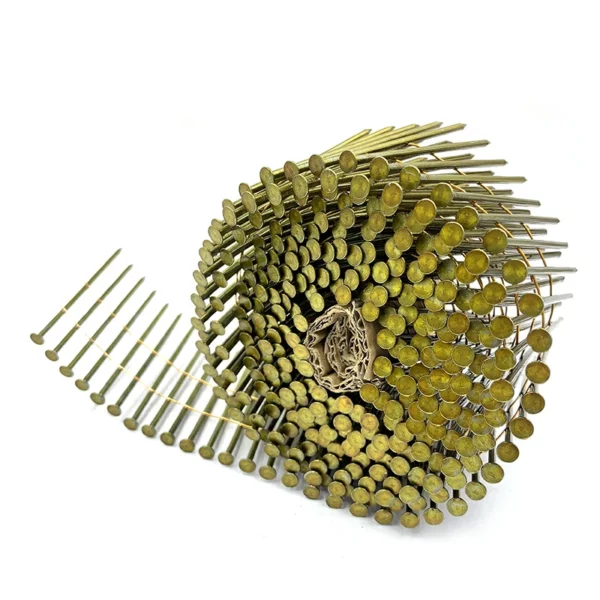Galvanized coil nails are a popular choice in construction, carpentry, and woodworking due to their numerous advantages. These nails are coated with a layer of zinc, providing enhanced protection against corrosion and extending their lifespan. In this article, we will explore the advantages of galvanized coil nails, highlighting their durability, cost-effectiveness, and suitability for various applications.
Corrosion Resistance and Durability
- Zinc Coating Protection:
The primary advantage of galvanized coil nails is their superior corrosion resistance. The zinc coating acts as a protective barrier, preventing the underlying steel from direct exposure to moisture, chemicals, and environmental elements that can lead to rust and deterioration. This coating significantly extends the lifespan of the nails, making them suitable for both indoor and outdoor applications. - High Durability:
Galvanized coil nails are designed to withstand demanding conditions. The zinc coating provides excellent durability, allowing the nails to maintain their structural integrity and strength over time. This durability ensures that the fastened materials remain securely in place, even in high-stress applications or adverse weather conditions.
Enhanced Cost-Effectiveness
- Longevity and Reduced Maintenance:
Galvanized coil nails offer long-lasting performance, reducing the need for frequent replacement. The corrosion-resistant properties of the zinc coating contribute to the longevity of the nails, minimizing maintenance costs associated with repairs or re-fastening. This durability translates into cost savings over the lifetime of the fastening solution. - Reliable Performance:
The use of galvanized coil nails helps prevent premature failures and material damage. The secure fastening provided by these nails ensures that structures, such as fences, decks, or framing, maintain their stability and integrity over an extended period. This reliability reduces the likelihood of costly repairs or replacements due to fastener failure.
Versatile Applications
- Outdoor Construction:
Galvanized coil nails are particularly well-suited for outdoor construction projects. They are commonly used in applications such as decking, fencing, roofing, and siding, where exposure to moisture, humidity, and varying weather conditions is a concern. The corrosion resistance of galvanized nails helps maintain the structural integrity of these projects, even in harsh environments. - Marine and Coastal Environments:
In marine and coastal regions where saltwater exposure is prevalent, galvanized coil nails are an excellent choice. The zinc coating provides exceptional protection against the corrosive effects of saltwater, making these nails suitable for docks, boardwalks, and other structures near the water. - General Carpentry and Woodworking:
Galvanized coil nails find widespread use in general carpentry and woodworking applications. They are suitable for fastening materials such as lumber, plywood, sheathing, and trim work. The corrosion resistance and durability of galvanized nails ensure the longevity and reliability of these connections.
What are the potential drawbacks or limitations of using galvanized coil nails?
While galvanized coil nails offer several advantages, it is important to consider their potential drawbacks and limitations as well. Here are some factors to keep in mind:
- Cost:
Galvanized coil nails tend to be slightly more expensive than non-galvanized nails due to the additional cost of the zinc coating process. This cost difference may impact the overall budget of a project, particularly for large-scale applications requiring a significant number of nails. - Limited Color Options:
Galvanized coil nails typically have a silver or gray appearance due to the zinc coating. If aesthetics are a priority in a project where the nails will be visible, the limited color options may not be desirable. In such cases, alternative nail types or finishes may be more suitable. - Potential for Coating Damage:
During installation, galvanized coil nails can be subject to coating damage, such as scratches or abrasions. If the zinc coating is compromised, the underlying steel may become exposed and more susceptible to corrosion. Care should be taken to handle and install galvanized nails properly to minimize coating damage. - Galvanic Corrosion:
Galvanized coil nails may experience galvanic corrosion when in contact with dissimilar metals, especially in certain environments. When galvanized nails come into contact with metals like copper, brass, or treated lumber that contains copper-based preservatives, a galvanic reaction can occur, potentially leading to accelerated corrosion of the nails. It is important to consider the compatibility of galvanized nails with other materials in the project to avoid galvanic corrosion. - Limited Availability of Specialty Sizes:
While galvanized coil nails are readily available in standard sizes, the availability of specialty sizes or specific nail configurations may be more limited compared to non-galvanized nails. If a project requires unique or specialized nail dimensions, it’s essential to ensure that galvanized options are available in those specific sizes. - Environmental Considerations:
The galvanizing process involves the use of zinc, which is a finite natural resource. The extraction and production of zinc have environmental impacts, including energy consumption and potential pollution. Additionally, the disposal of galvanized nails should be handled properly to minimize environmental harm. - Potential for Brittle Coating:
In some cases, the zinc coating on galvanized coil nails may become brittle over time, especially in extreme temperature variations. This brittleness can lead to the coating cracking or peeling, potentially exposing the steel beneath and reducing the protective properties of the nails.
It’s important to assess the specific requirements and conditions of a project before deciding to use galvanized coil nails. Considering factors such as budget, aesthetics, compatibility with other materials, and environmental considerations will help determine whether galvanized coil nails are the most suitable choice for a particular application.
Galvanized coil nails offer a range of advantages, making them a reliable choice for various fastening applications. Their corrosion resistance, durability, galvanized coil siding nails and cost-effectiveness contribute to their popularity in construction, carpentry, and woodworking projects. With their ability to withstand harsh environmental conditions and provide long-lasting performance, galvanized coil nails offer a strong foundation for secure and durable connections. By choosing galvanized coil nails, professionals and DIY enthusiasts can ensure the longevity and reliability of their projects while minimizing maintenance costs.
